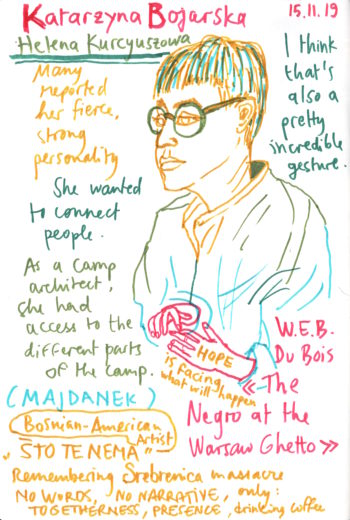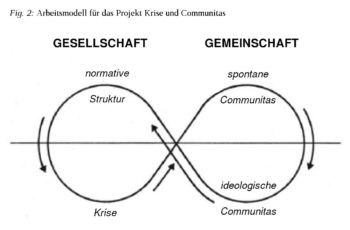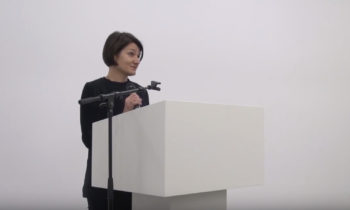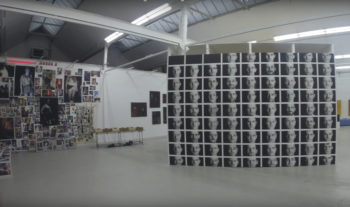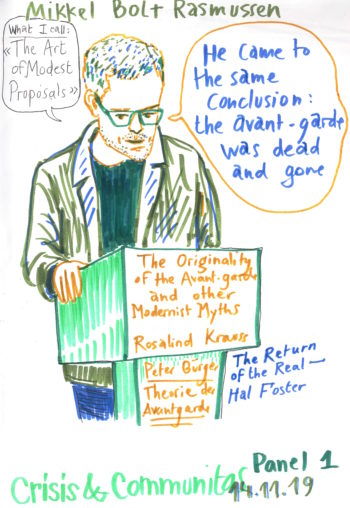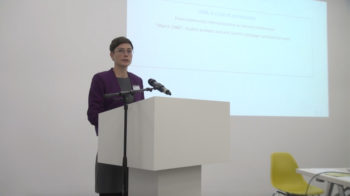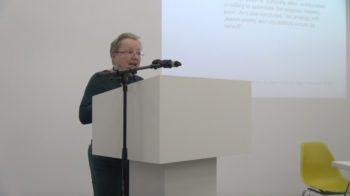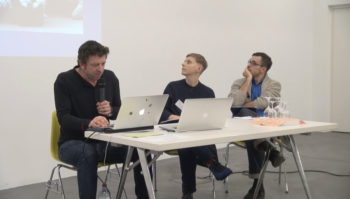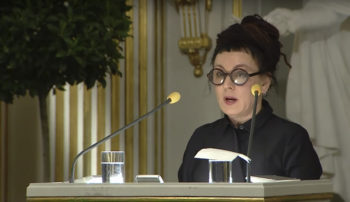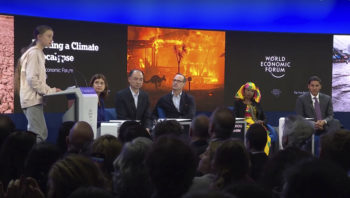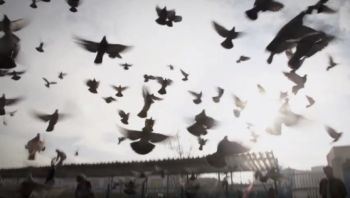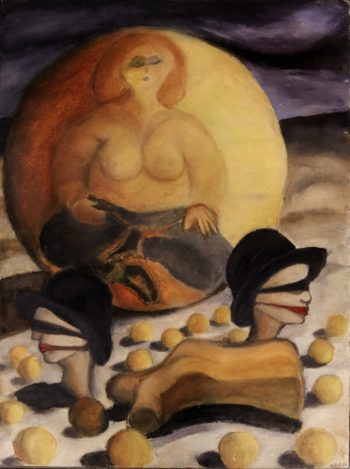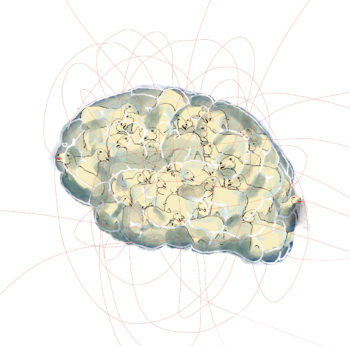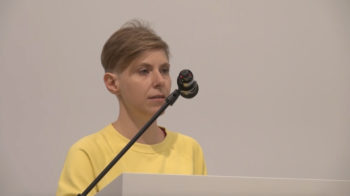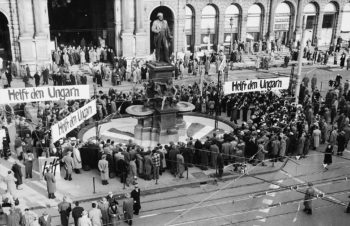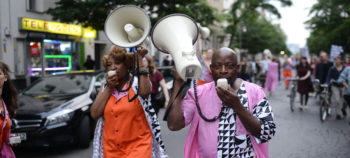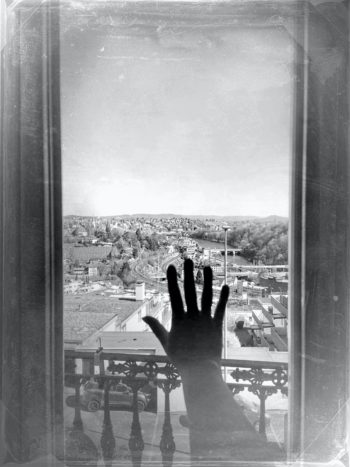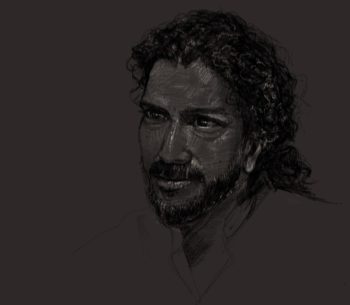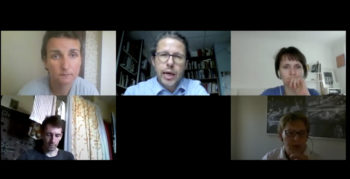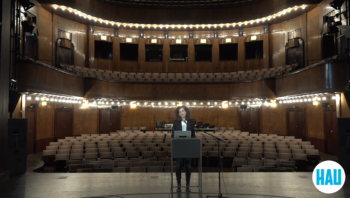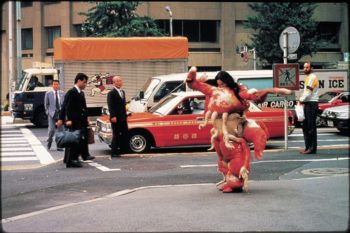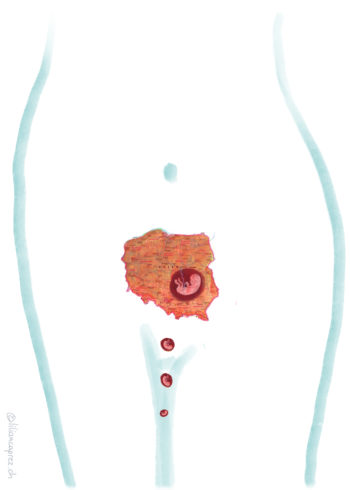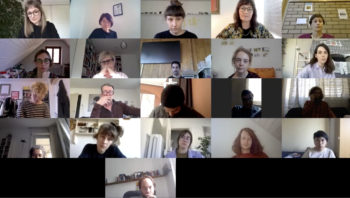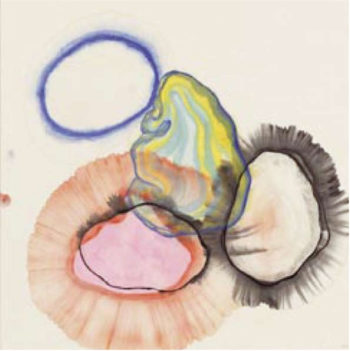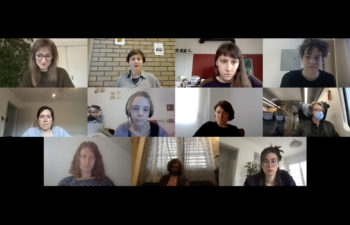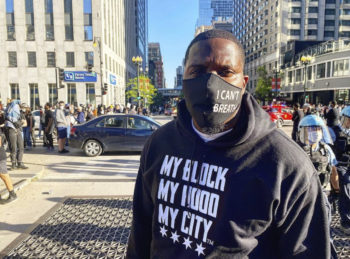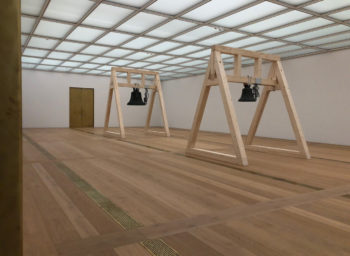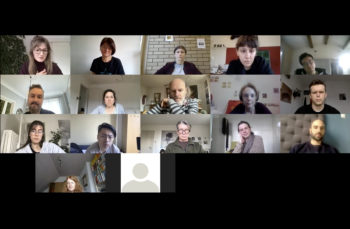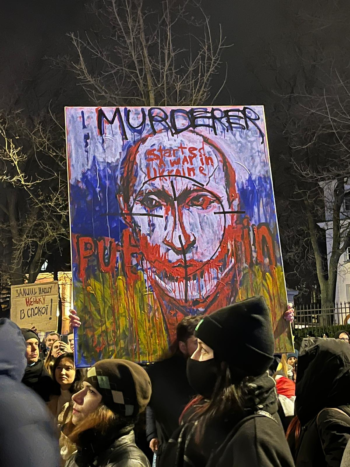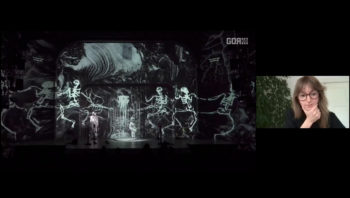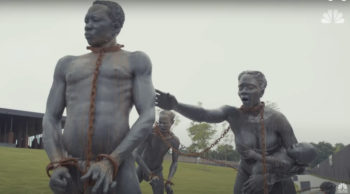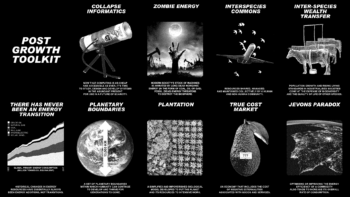Communitas: Globale Problemlösung oder unmögliche Theorie?
Text: Monika A. Ciemięga
Feb 23rd 2021
Der Communitas-Begriff ist für das Verständnis und die Analyse von Kultur unabdingbar. Jeder Mensch und jede Kultur ist von Beziehungen geformt und umgeben – in einer Communitas könnten diese Beziehungen zahllose Krisen verhindern. Ist eine globale Gemeinschaft vorstellbar, die in egalitärer Entscheidungsfindung globale Probleme löst und abwendet? Und kann der Begriff dabei helfen, globale Krisen und Beziehungen besser zu verstehen? Ein Essay.
Read more
Divided We Stand or Revolutionary Love in the Making. A lecture by Katarzyna Bojarska
Text: Katarzyna Bojarska
Apr 26th 2020
If as Ernst van Alphen claims, «affect is the opposite of personal: it is social.» What it means is not so much that affects are not owned by individuals but rather, that their very origin is social, they are produced by and in interactions with numerous agent such as other people (their bodies most specifically) […]
Read more
Die Krise-Communitas-Schleife im Kunstkontext. Prämisse
Text: Dorota Sajewska Nina Seiler
Aug 25th 2019
Der schottisch-amerikanische Anthropologe Victor Turner war massgeblich an der konzeptuellen Herausarbeitung des Zusammenhangs von Communitas und Krise beteiligt. Die Communitas als offene, egalitäre und solidarische Gemeinschaftlichkeit sucht ethnische, nationale und sozialhierarchische Grenzen wie Geschlecht oder Klasse zu überwinden und ein Gegengewicht zur «kalten», normierenden Struktur der Gesellschaft zu bilden. Gemäss Turner basiert Communitas nicht auf […]
Read more
An Introduction to the Symposium «Crisis and Communitas»
Text: Dorota Sajewska
Apr 7th 2020
Crisis is a term increasingly heard these days – climate crisis, migration crisis, crisis of representation, identity, masculinity… Contemporary societies often react to crises by installing mechanisms of classification and order. Identitarian communities perceive themselves as an antidote to personal and social crises. On 14 and 15 November 2019, the symposium «Crisis and Communitas. Performative […]
Read more
Momente von Communitas in der Ausstellung «Problem gelöst? Geschichte(n) eines Virus»
Text: Susanne Wegmann
Jan 18th 2020
In den 1980er Jahren brach in Zürich die Aidskrise aus. Die Ausstellung verfolgt die Geschichte des HI-Virus in der Schweiz – vom Individuum zur Gruppe, von damals bis heute – um die Thematik im Bewusstsein der Gesellschaft zu halten, zu entstigmatisieren und zu informieren.
Read more
The Avant-Garde of Destitution. A lecture by Mikkel Bolt Rasmussen
Text: Mikkel Bolt Rasmussen
Apr 22nd 2020
Within art historical scholarship it is customary to argue that the avant-garde disappeared with World War Two or at the latest in the 1960’s. As Rosalind Krauss writes in her influential essay “The Originality of the Avant-Garde”: “The historical period that the avant-garde shared with modernism is over.” Mikkel Bolt Rasmussen argues in his lecture […]
Read more
Crisis of Communitas or the Extension of «Our» World. A lecture by Nina Seiler
Text: Nina Seiler
Apr 21st 2020
Even though communism initially builds upon a concept of communitas as an egalitarian, open community, its historical reality often turned out more on the side of immunitas: mechanisms of othering and detachment led to the exclusion and condemnation of people because of their class, beliefs, language or ethnical background. “March 1968” symbolically marks a turn […]
Read more
Speculative Communities: Designing Contact Zones in Times of Eco-Eco-Crisis. A lecture by Malgorzata Sugiera
Text: Malgorzata Sugiera
Apr 18th 2020
In her lecture, Małgrozata Sugiera premises on Arturo Escobar’s observation that the recent global Eco-Eco-Crisis is “the crisis of a particular world or set of world-making practices, the dominant form of Euro-modernity” (Designs for the Pluriverse, 2017). Therefore, what is urgent is “a transition from the hegemony of modernity’s one-world ontology to a pluriverse of […]
Read more
Potent Collectivities: Aesthetics of Solidarity. A lecture by Jeremy Gilbert
Text: Jeremy Gilbert
Apr 8th 2020
A key feature of neoliberal culture has been its systematic inhibition of the emergence, survival and empowerment of ‘potent collectivities’ on any scale: from socially functional neighbourhoods to national political movements to transnational networks of solidarity. Democracy itself might be described as the potentiation of complex collectivities; and the directly anti-democratic, anti-social nature of neoliberalism had […]
Read more
Cultural change in Poland. The end of conservative consensus or a fascist future?
Text: Tadeusz Koczanowicz
Mar 5th 2020
Comments that appeared in the public sphere after the autumn elections in Poland didn’t take into account an important cultural dimension of the elections. The same can be said about the articles on the upcoming presidential elections in May 2020. People writing about Polish politics seem to look only at surveys or analyze performances of […]
Read more
The philosophical debate about biopolitics in times of CoVid-19
Apr 5th 2020
At the end of February, the philosopher Giorgio Agamben reacted to the measures taken by the Italian government to face the CoVid-19 pandemic. “[T]he invention of an epidemic”, he wrote, “could offer the ideal pretext for broadening such measures beyond any limitation”[1] and thus reinforced his well-known thesis on the normalisation of the use of […]
Read more
The Tender Narrator. Olga Tokarczuk’s Nobel Lecture
Dec 9th 2019
In her Nobel Lecture Polish author Olga Tokarczuk talks about the emergence of a first-person narrative, its implications, the multiplicity of narratives and literature’s role in it. She also comes back to the imperative to be tender. «Tenderness is deep emotional concern about another being, its fragility, its unique nature, and its lack of immunity […]
Read more
«Our house Is Still On Fire» – Greta Thunberg on Averting a Climate Apocalypse
Jan 22nd 2020
“Our house is still on fire.” With this words Greta Thunberg startet her speech at the World Economic Forum in Davos on Tuesday, 21 February 2020, reprising her most famous line from an address last year at the forum. “Your inaction is fueling the flames by the hour.” Her remarks opened a panel discussion hosted […]
Read more
Transformation. Memory and Matter in Early Polish Capitalism
Text: Dorota Sosnowska
Mar 30th 2020
The process of political and economic transformation which started in Poland in the late eighties is narrated in terms of regaining freedom and establishing democracy. The end of the totalitarian regime also brought the end of censorship and political persecution, the beginning of the free market, and the free flow of commodities. However, on the […]
Read more
On the origins of post-enlightenment nation in Poland
Text: Przemysław Czapliński
Jan 17th 2020
The present political majority in Poland (which supports the right-wing government) is characterized by nationalism and anti-refugee sentiments. The genesis of a thus-shaped majority should be traced back to post-1989 deregulation of social rights and dismantling of the working and peasant class. Following the disintegration of the previous class order, the only political subject capable of exerting influence on the government turned out to be a nationalistic community. This community treats nationalism as the basis of its political contract with the authorities and regards xenophobia as an instrument of its own agency.
Read more
The Community of Hope – a song by PJ Harvey
Text: Sandra Biberstein
Jul 9th 2019
Right in the middle of it. This is where PJ Harvey’s ninth album «The Hope Six Demolition Project» begins. Right in the middle of the «Community of Hope», which is located at the Benning Road – also known as «Pathway of death» – in the quarter Ward 7. It is a place of crisis, misery […]
Read more
Im transgenerativen Prozess. Die Angst als Drehmoment
Text: Jeannette Fischer
Feb 12th 2020
Panikattacken und Angstzustände – aufgrund familiärer Zusammenhänge? Generationenüberschreitende Ängste können trennendes wie verbindendes Moment zugleich sein. Die feministische psychoanalytische Bindungstheorie arbeitet hier mit dem Konzept der intersubjektiven Beziehung – einer nicht-hierarchischen Bindung zwischen Menschen, auf die Gemeinschaft und Gesellschaft hochgerechnet werden kann.
Read more
Archeologia traumy aborcyjnej
Text: Dorota Sajewska
Jul 9th 2019
Na kilka dni przed premierą Klątwy Oliviera Frljicia, która stała się spektakularną manifestacją konfliktu teatru i Kościoła we współczesnej kulturze polskiej, uczestniczyłam w zdarzeniu, które kazało mi gruntownie przemyśleć problematykę aborcji jako istotnej stawki w rozgrywce sztuki awangardowej o władzę symboliczną, a zarazem jako zagadnienia transnarodowego, którego lokalne przejawy stanowią symptomy przemian zachodzących w polityce […]
Read more
«People only support what they create»
Text: Sandra Biberstein
Feb 5th 2020
Über das Potential von Kollektiven. Ein Interview mit Emanuel Wehrli, Céline Hafner und Caesar Anderegg vom «Klimastreik Winterthur».
Read more
Anthropospectral Mismatches in Konwicki’s Zwierzoczłekoupiór: An Outline
Text: Nina Seiler
Sep 2nd 2019
Polish writer Tadeusz Konwicki’s 1969 novel Zwierzoczłekoupiór (The Anthropos-Spectre-Beast) may be regarded as a children’s tale, but it is just as much a mapping of the social and cultural order after the events of the so-called Polish March 1968. Its escapist note reflects the isolation and despair felt by individuals in the crisis of commonality[1] […]
Read more
Antonin Artaud zur Kulturkrise
Aug 27th 2019
Zu Beginn des 20. Jahrhunderts fand sich Europa in einer regelrechten Kulturkrise wieder: ein radikaler kultureller Wandel wälzte aufgrund der Industrialisierung im 19. Jahrhundert das Alltagsleben, die Arbeitswelt wie auch Wissenschaft und Kunst um. Wahrnehmungs- Denk- und Handlungsmuster wurden erschüttert. Dies führte dazu, dass sich völlig neue Verhaltensweisen herausbildeten. Insbesondere das Theater der historischen Avantgardebewegungen […]
Read more
Coronavirus: a disaster of capitalism’s making
Text: Ben Hillier
Mar 7th 2020
What to do if confronted with an extremely contagious virus that medical experts say they have not seen before and don’t understand, and which is fast spreading and killing hundreds of people? a) Take precautionary measures to stop the virus spreading and prepare the health system for a potential shock? Or b) Ignore it, blithely […]
Read more
Polish Transformation: Community Crisis and Question of Ephemerality in Arts. A lecture by Dorota Sosnowska
Text: Dorota Sosnowska
May 1st 2020
The process of political and economic transformation which started in Poland in late eighties is narrated in terms of regaining freedom and establishing democracy. The end of totalitarian regime brought the end of censorship, of political persecution, the beginning of the free market and free flow of commodities. But on the other hand Polish transformation […]
Read more
BEHAVE, O BODY: scripting my corporeality in face of Covid-19
Text: Nina Seiler
May 4th 2020
In recent weeks, one practice in particular became (in)famous in slowing down the Covid-19 pandemic: social distancing. But the strategy of „distancing“ first and foremost means physical separation and disciplining along scripts for the performance of bodies. Thus, the interaction with others and ourselves gains an edge on body awareness. A glimpse at a corporeality in Zurich, Switzerland.
Read more
La Suisse et la crise de 1956 – solidarité, actions et paradoxes
Text: Tiphaine Robert
May 9th 2020
Lorsque 200 000 personnes ont fui leur pays après le soulèvement hongrois d’octobre 1956, la Suisse a fait preuve d’une solidarité sans précédent. Elle a accueilli quelque 13 000 personnes sans condition. Tiphaine Robert examine les effets de la crise de 1956 et son impact sur la politique d’asile en Suisse.
Read more
Wirus kapitalizmu
Text: Przemysław Wielgosz
May 20th 2020
Prawda o nieludzkim i antydemokratycznym charakterze kapitalizmu rzadko bywa tak dobrze widoczna jak podczas pandemii, której jesteśmy świadkami. Zarazem jest ona okazją do postępowej zmiany społecznej na wielką skalę. Czy to prawda, że jak mawiał Mao Zedong, skoro na świecie zapanował chaos, sytuacja jest znakomita?
Read more
Requiem for the Students
Text: Giorgio Agamben
May 26th 2020
Giorgio Agamben writes about the end of being a student as a form of life and about the decay of universities in the times of e-learning.
Read more
Die Chöre der Angekommenen. Eine indiskrete Platzbefragung
Text: Sandra Biberstein
Aug 25th 2020
Drei Jahre lang war der Berliner Oranienplatz von Geflüchteten und ihren Unterstützer*innen besetzt. Im April 2014 wurde der Platz geräumt und damit auch der Protest gegen die Residenzpflicht und Abschiebepraxis mit Polizeigewalt beendet. Das Schwabinggrad Ballett und die aus der Refugee-Gruppe «Lampedusa in Hamburg» hervorgegangenen Arrivati haben Besetzer*innen interviewt und die Konflikte in die «Chöre […]
Read more
Правоугаони (п)оглед – der rechteckige Versuch
Text: Haris Kurtisi
May 27th 2020
In einer Selbstreflexion versuchte ich anhand der aktuellen Situation rund um Corona, Lockdown und Pandemie mir ein Bild darüber zu machen, was ein Mensch zu Hause in Selbstisolation erlebt und welche Fragen einem beschäftigen. Seht es als Dokumentation oder Inszenierung – oder beides!
Read more
Lockdown hinter einem Fenster
Text: Valeria Egli
May 27th 2020
Abstandhalten, Maskenpflicht, Ausgangssperre… Das ist kein Horrorfilm, das ist unsere Realität. Im Jahr 2020 leidet die ganze Welt unter einem gefährlichen Virus und alle Menschen sind davon betroffen – wir sind alle wegen des Virus in unserem Alltagsleben eingeschränkt. In meiner Fotoserie will ich mithilfe des Motivs von Fenstern versuchen, unsere heutige Zwangssperre wiederzugeben.
Read more
«The Winter of Absolute Zero»: Interview with Shaj Mohan
Text: Auwn Gurmani
Jun 2nd 2020
The philosopher Shaj Mohan talks in the interview with Auwn Gurmani about hypophysics, a thinking that identifies Gandhi’s description of the “good value” of a thing with “natural state”. He notes that hypophysics is a species of racism. The idyllic a priori that Gandhi refers to corresponds to the experiences of privileged groups, the life of the highest castes. This idyll is maintained by colonial conditions. As an alternative, Shaj Mohan pleads for a “world democracy”, which we achieve through the obscure experience.
Read more
“I can’t breathe”: Riots against racism as new grounds for international solidarity
Jun 23rd 2020
“I can’t breathe”: the last sentence of the African-American George Floyd, who was stifled by the Minneapolis police, resonates powerfully in the context of the Covid-19 pandemic. Indeed, the global health crisis has highlighted the inequalities in health care systems, especially in the US, where the African-American population is particularly affected. Beyond police violence, it […]
Read more
«The silence on the streets should never be mistaken for a quiet submission in politics» – An interview with Shaj Mohan
Text: Krithika Varagur
Jul 12th 2020
In the interview with Krithika Varagur philosopher Shaj Mohan talks about the protests in India and its similarities to the situation in the United States. He points out that what we perceive as extreme events, such as pogroms and lynching, are prepared by everyday discriminations.
Read more
The Sociology of Belarusian Protest. A webinar
Aug 27th 2020
Belarusian voices are few and far between in international debates about the ongoing protests in Belarus. In this webinar, Belarusian sociologists will share their views and analysis of the current protest wave. Among other things, they discuss the role of striking workers; class, gender, and violence; patterns of mobilization and self-organization; the mobilizing effects of trauma; the impact of urban space; the legacy of previous protests; the role of protest in forging different types of communities; and the ways in which the post-industrial shift and other long-term transformations in Belarusian society have affected its political economy.
Read more
Der gemeinschaftliche Theatertraum in Covid-19-Zeiten
Text: Louise Décaillet
May 19th 2020
Die Pandemie des Covid-19 trifft im Theaterbetrieb einen besonders sensiblen Nerv. Von der physischen Bühne zum bodenlosen Cyberspace, vom Publikum zur unsichtbaren Internet-Crowd ist der „gemeinschaftliche Traum“ neu zu erfinden, und dies unter technisch-ästhetischen Bedingungen, die das Theater eher wie ein alter Alptraum anmuten lässt. Doch über die jetzige Krisensituation hinaus mag dies dazu ermuntern, das „Gemeinsame“ des Theaters bzw. der Kunst in einer digitalisierten Kultur zu reflektieren.
Read more
Threshold: Arts in Times of Crisis. An Online Exhibition of the Performa Biennale
Text: Louise Décaillet
Oct 7th 2020
While the coronavirus still rages in the US, the Performa Biennale reacts to the current climate of crisis by devoting a free online exhibition to it. In “Threshold. Arts in Times of Crisis”, art works from the five last decades, including performance video recordings or pieces of video art, are broadcasted live 24 hours a day in a loop on the Biennale’s free access page.
Read more
Polens Opferrolle. Interview mit Dorota Sajewska zur Abtreibungsdebatte in Polen.
Text: Sandra Biberstein
Oct 24th 2020
Am 22. Oktober 2020 hat das oberste Gericht Polens das bereits restriktive Abtreibungsgesetzes verschärft. Die vorsitzende Verfassungsrichterin Julia Przylebska erklärte Schwangerschaftsabbrüche im Falle einer schweren Fehlbildung des Fötus für verfassungswidrig. Warum in der Abtreibungsdebatte der letzten Jahre das «ungeborene polnische Kind» als radikale Manifestation des Opfers einer atheistischen, also nicht-polnischen Gesellschaft gesehen wird und wie diese Opferrolle mit der Geschichte Polens zusammenhängt, erklärte die Kulturwissenschaftlerin Dorota Sajewska im Interview, das im März 2017 geführt wurde.
Read more
Webinar Theater und Communitas #1: Gob Squad’s “Show Me A Good Time”
Mar 21st 2021
Wie kann eine Performance die ständige mediale Vernetztheit aufgreifen, die unsere menschlichen Beziehungen seit Beginn der Pandemie verstärkt bedingt? Wie wirkt sich die Digitalität auf die Erfahrung der Präsenz und des Miteinanderseins im Theater aus? Diese und noch andere Fragen haben wir im Webinar Theater und Communitas mit Aenne Quiñones, stellvertretende künstlerische Leiterin des HAU Hebbel Am Ufer in Berlin und Herausgeberin des Buches «Gob Squad. What Are You Looking At?» (Alexander Verlag, Berlin, 2020), besprochen.
Read more
Pandemische Apartheid
Text: Przemysław Wielgosz
Mar 4th 2021
Kaum wurde der große Impf-Sieg über die Pandemie verkündet, begannen schon die Probleme. Lieferpausen sollen die Produktionskapazität der Fabriken erhöhen. Die bereits bestellten Mengen machen die Impfstoffe für ärmere Länder praktisch unerreichbar. Und die Strategien in der Impfstoffproduktion sowie -verteilung machen klar: Die vorgeschlagenen Lösungen kranken an der Privatisierung des Gesundheitssektors und der Ausrichtung an maximalem Gewinn. Ein Kommentar von Przemysław Wielgosz.
Read more
Webinar Theater und Communitas #2: “Nach dem Ende der Versammlung III – Das Theater” von andpartnersincrime
Mar 21st 2021
„Jeder Mensch ist ein Künstler“, „Alle sind gleich“, „We, the people“ – eine Gruppe von Künstler*innen setzen während des Lockdowns diese Mottos in die Praxis um, indem sie einen Raum schaffen, wo jede*r mit ihnen gemeinsam kochen und essen kann. „Ada_kantine“ wurde so zu einer Alternative zu den institutionalisierten Versammlungen wie lokalen Parlamenten oder Theatern […]
Read more
Krisen als Viren – virale Krisen
Text: Janis Huber
Mar 17th 2021
Wenn ontologische Fragen zu Kultur und Kommunität[1] im Zentrum eines privat oder öffentlich geführten Diskurses, eines Seminars oder Kolloquiums, einer Diskussion oder eines Gesprächs stehen, sich plötzlich jedoch nicht bloss die vom einzelnen Subjekt her gedachten, geografisch nahen Kulturen und Kommunitäten in einer epidemischen Krise befinden, sondern zugleich auch alle geografisch fernen, quasi die Summe […]
Read more
Glockenspiele. William Forsythes «The Sense of Things» als vielfältiger Übergangsritus
Text: Max Glauner
Jul 2nd 2021
Mit der ersten Welle der Covid-19-Pandemie in der Schweiz wurde ab dem 3. März 2020 bisher eingeübte und selbstverständliche Regeln der Zivilgesellschaft, deren Ökologien und Ökonomien massiv in Frage gestellt.[1] Davon betroffen waren nicht nur soziale Verhaltensmuster und politische Entscheidungswege, Betriebsabläufe und Wirtschaftsflüsse, sondern in hohem Masse auch Bildungseinrichtungen sowie das Kunstfeld und die Kulturindustrie, […]
Read more
Webinar Theater and Communitas #3: Come Together and Enter Full Screen by Wojtek Ziemilski
Mar 21st 2021
Above a stage played by five actors, an inscription forbids the sitting audience from entering the stage. Yet this is what the actors of Come Together relentlessly invite the spectators to do throughout the entirety of the performance. Through all kinds of speeches and actions, the actors provoke the audience in a sometimes seductive, sometimes imploring or even […]
Read more
The Ogre Goes to Ukraine. A Commentary
Text: Tadeusz Koczanowicz
Feb 24th 2022
On February 24, Russia started a full-scale invasion of Ukraine, resulting in the declaration of a state of war. Tadeusz Koczanowicz outlines in his commentary on Putin’s appearances, how his speak is consisted of rumblings about Russian history and current diplomacy and that there is no sense in his claims, but only underlying violence.
Read more
Ukraine is a country, not a sphere of influence
Text: Tadeusz Koczanowicz
Mar 17th 2022
Among Western journalists and political analysts there is noticeable trend to analyze the war in Ukraine in terms of “spheres of influence”. This imperial thinking frames the land conquest ordered by Vladimir Putin as a reaction to “Western expansion”. In a desperate bid to say something original, talking heads and Twitter intellectuals from both the left and the right talk about “NATO’s overexpansion in the East” and thereby reinforce Putin’s claims that Russia is threatened.
Read more
Webinar Theater und Communitas #5: Death Positive – States of Emergency von Yael Ronen und Ensemble
May 21st 2021
«Death Positive – States of Emergency» von Yael Ronen und Ensemble ist eines der wenigen aktuellen Stücke, das die Corona-Pandemie nicht nur mit Masken und Desinfektionsmittel zitiert, sondern auf der Bühne des Berliner Maxim Gorki Theaters zum tatsächlichen Mittelpunkt der Aufführung macht – und gleichzeitig weit darüber hinausgeht. Künstlerische Freiheit sowie das Potenzial des Theaters, […]
Read more
Monuments Across the United States Re-Emerged as Targets of Rage
Jun 10th 2020
Amid the wave of protests over police violence shaking the United States, public monuments of all kinds have become symbolic flash points. But the destruction or removal of statues is not necessarily the right way to deal with the unloved historical heritage.
Read more
Post Growth Toolkit – A toolkit to facilitate orientation in the context of the current environmental crises
Jun 17th 2022
What follows after growth? The idea of relentless growth and progress is nowadays the only economic force that matters. It means increased living standards. But at the same time, it would be irresponsible to continue ignoring the human and environmental costs, the lost livelihoods and damaged landscapes that economic growth and all its promises causes. […]
Read more
To Watch the War. An Interview mit Olexii Kuchanskyi and Oleksiy Radynski.
Text: Sandra Biberstein
Oct 24th 2022
For the proof of war crimes and the medial mediation of the events, but also for finding a language of violence, destruction, solidarity, compassion and resistance, the documentation of the events is essential. But what does it mean to document war? And what is the role of the arts, especially film? Film programmer Olexii Kuchanskyi and filmmaker Oleksiy Radynski have organized an exhibition named “To Watch the War,” which shows 18 films at the Coalmine – Raum für Fotografie. In conversation with Sandra Biberstein they talked about the developments in experimental film and video work since the invasion that began 2014 in an attempt to suppress the popular Maidan uprising in Ukraine.
Read more
Making of a Nation or a New Social Sensitivity? Edward Abramowski and the Frankfurt School
Text: Tadeusz Koczanowicz
Nov 10th 2022
Today, anti-state slogans, especially in the United States, are strongly associated with right-wing politics. After the 20th century, and especially the last thirty years, the idea of “non-state socialism” or “stateless socialism” might sound like a contradiction. That’s what I initially found interesting in the writings of Edward Abramowski, a Polish socialist, psychologist and intellectual […]
Read more
Das Anthropozän Erzählen: fünf Narrative
Text: Gabriele Dürbeck
Oct 21st 2022
Um den Begriff des Anthropozän hat sich in Wissenschaft und Öffentlichkeit seit 2000 ein kontroverser Diskurs entwickelt. Gabriele Dürbeck zeugt, inwiefern unterschiedliche, erzählerisch strukturierte Geschichten der gesellschaftlichen und politischen Sinnstiftung dienen.
Read more
